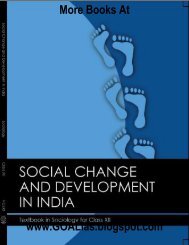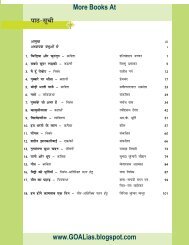t.com www.GOALias.blogspot.com www.GOALias.blogspot.com
t.com www.GOALias.blogspot.com www.GOALias.blogspot.com
t.com www.GOALias.blogspot.com www.GOALias.blogspot.com
- No tags were found...
Create successful ePaper yourself
Turn your PDF publications into a flip-book with our unique Google optimized e-Paper software.
<strong>www</strong>.<strong>GOALias</strong>.<strong>blogspot</strong>.<strong>com</strong>India’s external relations 79Fast Forward India’s Nuclear ProgrammeIndia has opposed the international treaties aimed at non-proliferation sincethey were selectively applicable to the non-nuclear powers and legitimisedthe monopoly of the five nuclear weapons powers. Thus, India opposedthe indefinite extension of the NPT in 1995 and also refused to sign theComprehensive Test Ban Treaty (CTBT).India conducted a series of nuclear tests in May 1998, demonstrating itscapacity to use nuclear energy for military purposes. Pakistan soon followed,thereby increasing the vulnerability of the region to a nuclear exchange. Theinternational <strong>com</strong>munity was extremely critical of the nuclear tests in thesubcontinent and sanctions were imposed on both India and Pakistan, whichwere subsequently waived. India’s nuclear doctrine of credible minimumnuclear deterrence professes “no first use” and reiterates India’s <strong>com</strong>mitmentto global, verifiable and non-discriminatory nuclear disarmament leading to anuclear weapons free world.Shifting alliances in world politicsAs you will read in Chapter Six and also in Chapter Nine, many non-Congress governmentscame to power in the period starting 1977. This was also the time when world politics waschanging dramatically. What did it mean for India’s external relations?The Janata Party government that came to power in 1977 announced that it would followgenuine non-alignment. This implied that the pro-Soviet tilt in the foreign policy will becorrected. Since then, all governments (Congress or non-Congress) have taken initiativesfor restoring better relations with China and entering into close ties with US. In Indianpolitics and in popular mind, India’s foreign policy is always very closely linked to twoquestions. One is India’s stand vis-à-vis Pakistan and the other is Indo-US relations. Inthe post-1990 period the ruling parties have often been criticised for their pro-US foreignpolicy.Foreign policy is always dictated by ideas of national interest. In the period after 1990,Russia, though it continues to be an important friend of India, has lost its global preeminence.Therefore, India’s foreign policy has shifted to a more pro-US strategy. Besides,the contemporary international situation is more influenced by economic interests than bymilitary interests. This has also made an impact on India’s foreign policy choices. At thesame time, Indo-Pakistan relations have witnessed many new developments during thisperiod. While Kashmir continues to be the main issue between the two countries, therehave been many efforts to restore normal relations. This means that cultural exchanges,movement of citizens and economic cooperation would be encouraged by both countries.Do you know that a train and a bus service operate between these two countries? Thishas been a major achievement of the recent times. But that could not avoid the near-warsituation from emerging in 1999. Even after this setback to the peace process, efforts atnegotiating durable peace have been going on.
















